In this article, Canstar Blue has defined some of the most energy efficient appliances in Australian kitchens, laundries and lounge rooms.
Canstar Blue sifted through a large selection of whitegoods from Appliances Online and found the most energy efficient appliances – from refrigerators to washing machines – so you’ll know what to look for next time you go shopping.
Here are some of the most energy efficient appliances in Australia for 2024:
On this page:
- How to find the most energy efficient appliances
- Most energy efficient fridges
- Most energy efficient dishwashers
- Most energy efficient washing machines
- Most energy efficient dryers
- Most energy efficient air conditioners
- Most energy efficient TVs
- Are these energy efficient appliances right for me?
- FAQs about energy efficient appliances
Show me
Compare energy plans
Here are some sponsored deals from the retailers on our database that include a link to the retailer’s website for further details. These are products from referral partners†. These costs are based on the Ausgrid energy network in Sydney but prices may vary depending on your circumstances. This comparison assumes general energy usage of 3900kWh/year for a residential customer on a single rate tariff. Please use our comparison tool for a specific comparison in your area and to see other products in our database that may be available. Our database may not cover all deals in your area. As always, check all details of any plan directly with the retailer before making a purchase decision.
|
9% Less than reference price |
$1,651 Price/year (estimated) |
Go to Site |
Here are some sponsored deals from the retailers on our database that include a link to the retailer’s website for further details. These are products from referral partners†. These costs are based on the Citipower network in Melbourne but prices may vary depending on your circumstances. This comparison assumes general energy usage of 4000kWh/year for a residential customer on a single rate tariff. Please use our comparison tool for a specific comparison in your area and to see other products in our database that may be available. Our database may not cover all deals in your area. As always, check all details of any plan directly with the retailer before making a purchase decision.
|
15% Less than VDO |
$1,238 Price/year (estimated) |
Go to Site |
Here are some sponsored deals from the retailers on our database that include a link to the retailer’s website for further details. These are products from our referral partners†. These costs are based on the Energex network in Brisbane but prices may vary depending on your circumstances. This comparison assumes general energy usage of 4600kWh/year for a residential customer on a single rate tariff. Please use our comparison tool for a specific comparison in your area and to see other products in our database that may be available. Our database may not cover all deals in your area. As always, check all details of any plan directly with the retailer before making a purchase decision.
|
9% Less than reference price |
$1,888 Price/year (estimated) |
Go to Site |
Here are some sponsored deals from the retailers on our database that include a link to the retailer’s website for further details. These are products from our referral partners†. These costs are based on the SA Power network in Adelaide but prices may vary depending on your circumstances. This comparison assumes general energy usage of 4011kWh/year for a residential customer on a single rate tariff. Please use our comparison tool for a specific comparison in your area and to see other products in our database that may be available. Our database may not cover all deals in your area. As always, check all details of any plan directly with the retailer before making a purchase decision.
|
9% Less than reference price |
$2,036 Price/year (estimated) |
Go to Site |
How to find the most energy efficient appliances
The government’s Energy Rating website is a good place to start when considering home electricity consumption and running costs. When assessing how much energy appliances use, consider your individual usage requirements that can put costs beyond the “average user” range.
It also helps to know how to read electricity ratings on each appliance to determine how energy efficient they are. These ratings are in the user manual or on the Energy Rating sticker at the front or side of the appliance.
Most energy efficient fridges
Often, the smaller the fridge, the more energy efficient it is. Luckily for consumers, appliance brands are improving energy efficiency for their larger models, with the likes of Haier and Hisense leading the way. Ensure you refer to the energy rating of whatever fridge that you’re interested in prior to purchase.
Haier 443L Refrigerator Freezer (HRF420BEC)
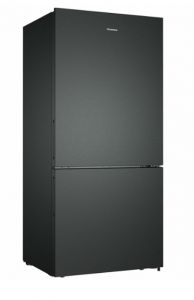
The Haier stands at 1725mm, has a width of 700mm and a depth of 675mm. Its fridge volume is 321L and its freezer volume is 112L. Most importantly, this model has been engineered for efficiency, coming in with one of Australia’s highest energy-efficiency ratings for fridges with eight stars.
To aid in this eight-star rating, Haier’s inverter and Multi-Zone Air cooling system ensures consistent airflow to every part of the refrigerator.
This fridge also features reversible hinges, which allows it to be seamlessly integrated into any home design. Expect this fridge to cost you about $1,499 (RRP).
- 8 stars for energy efficiency
Hisense 503L Bottom-Mount Fridge (CNEF4315)
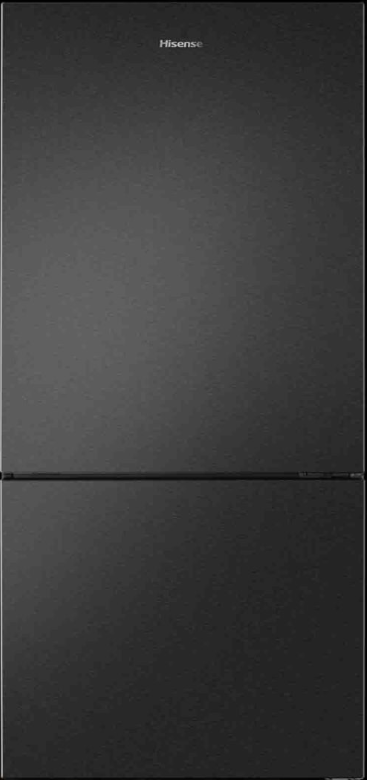
This Hisense model is equipped with Total No Frost, which dispenses cold air evenly and helps avoid manual defrosting. With durable inverter technology, antibacterial crispers and double metal glide freezer drawers, this 503L fridge helps to store food long-term with energy efficiency worthy of eight stars. It offers 503L total capacity, with super freeze and super cool modes to help lock-in freshness.
This model comes in a dark stainless-steel finish and should cost $1,599 (RRP). According to Hisense’s website, the 503L Bottom-Mount Fridge consumes 174 kWh annually.
- 8 stars for energy efficiency
Most energy efficient dishwashers
With the different types of dishwasher available, investing in a new one can be a daunting process. There are built-in (or integrated), freestanding and dishdrawers, all with varying degrees of energy efficiency.
V-ZUG AdoraDish V6000 Fully Integrated Dishwasher with Heat Pump (4112100007)
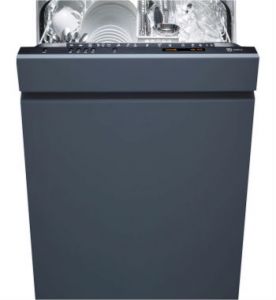
Knocking its energy-efficiency rating out of the park with a perfect six, the AdoraDish features 12 washing programs including an eco and glass wash cycle function. Its OptiStart features adds an ‘extra dimension’ to the delay start feature by wetting the dishes prior to start time, helping to soften the dirt and grime which allows the machine to run at a lower temperature. This feature is claimed to reduce energy consumption by 10%.
The unit is 867mm tall and operates at 43 decibels. It earned a six-star energy rating and uses a low 111kWh of energy each year, on average. It also boasts a five-star water rating using just 11.2L per cycle. Expect to pay a fairly hefty sum of around $6,500 (RRP) for this dishwasher, but for top quality and energy efficiency, you may find the price is worth it.
- 6 stars for energy efficiency
- 5 stars for water efficiency
Miele Active Plus Integrated Dishwasher (G 5210 SCi)
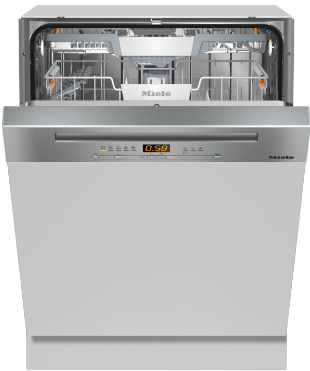
This Miele integrated dishwasher comes with EcoPower technology, is suitable to larger households or those who love to entertain. Coming with nine wash programs, this unit has earned a 4.5-star energy-efficiency rating and consumes on average 185kWh of energy a year. In terms of water efficiency, it has earnt a six-star rating using just 9.2L per cycle. Additionally, it operates at a low noise level of 45 decibels, making it one of the quieter washers on the market.
While it might not have the same energy-efficiency rating as the V-ZUG model above, it can be found for a cheaper price of $2,149 (RRP).
- 4.5 stars for energy efficiency
- 6 stars for water efficiency
Most energy efficient washing machines
Prior to purchasing a new washing machine, you’ll need to decide whether you prefer a front loader or a top loader. According to Appliances Online, front loader washing machines are the most energy efficient model of dishwasher.
V-ZUG AdoraWash V6000 8kg Front Load Washing Machine (1102510010)
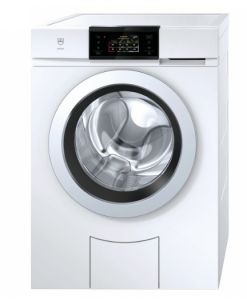
With 8kg capacity, this V-ZUG AdoraWash front loader gets a near perfect 5.5 stars for energy efficiency and four stars for water efficiency. It contains a massive 18 pre-programmed functions, and perhaps most noteworthy, a delayed start function. This gives households the ability to select the time they want to start their wash, allowing for use of cheaper off-peak energy prices if applicable.
It boasts an average energy consumption of 148kWh a year and uses 69L of water a cycle. With a price tag of $6,700 (RRP) it’s definitely a high-end washing machine, but the trade-off is more efficient operation.
- 5.5 stars for energy efficiency
- 4 stars for water efficiency
Compare cheap electricity plans
Here are some of the cheapest published deals from the retailers on our database that include a link to the retailer’s website for further details. These are products from referral partners†. These costs are based on the Ausgrid network in Sydney but prices may vary depending on your circumstances. This comparison assumes general energy usage of 3900kWh/year for a residential customer on a single rate tariff. Please use our comparison tool for a specific comparison in your area. Our database may not cover all deals in your area. As always, check all details of any plan directly with the retailer before making a purchase decision.
Here are some of the cheapest published deals from the retailers on our database that include a link to the retailer’s website for further details. These are products from referral partners†. These costs are based on the Citipower network in Melbourne but prices may vary depending on your circumstances. This comparison assumes general energy usage of 4000kWh/year for a residential customer on a single rate tariff. Please use our comparison tool for a specific comparison in your area. Our database may not cover all deals in your area. As always, check all details of any plan directly with the retailer before making a purchase decision.
Here are some of the cheapest published deals from the retailers on our database that include a link to the retailer’s website for further details. These are products from referral partners†. These costs are based on the Energex network in Brisbane but prices may vary depending on your circumstances. This comparison assumes general energy usage of 4600kWh/year for a residential customer on a single rate tariff. Please use our comparison tool for a specific comparison in your area. Our database may not cover all deals in your area. As always, check all details of any plan directly with the retailer before making a purchase decision.
Here are some of the cheapest published deals from the retailers on our database that include a link to the retailer’s website for further details. These are products from referral partners†. These costs are based on the SA Power network in Adelaide but prices may vary depending on your circumstances. This comparison assumes general energy usage of 4000kWh/year for a residential customer on a single rate tariff. Please use our comparison tool for a specific comparison in your area. Our database may not cover all deals in your area. As always, check all details of any plan directly with the retailer before making a purchase decision.
Most energy efficient dryers
According to the government’s Energy Rating website, heat pump clothes dryers are the most energy efficient dryer. But before you invest in one, be sure to weigh up the differences between a heat pump and a condenser dryer and decide what best suits your needs. A heat pump dryer operates in a similar way to a reverse-cycle air conditioner. It has a closed-loop heat exchange system that uses hot air to absorb moisture from your clothes.
Two brands that are innovating the market are Bosch and Fisher & Paykel.
Bosch Series 8 Heat Pump Tumble Dryer 8kg (WTX88M20AU)
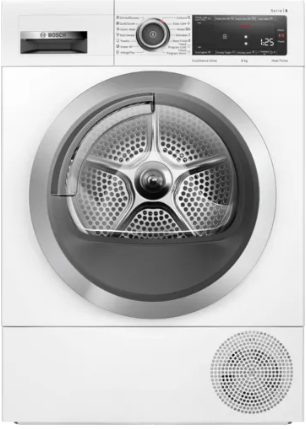
This heat pump clothes dryer from Bosch earned 10-stars for energy efficiency. It comes with 14 different drying programs, including specific cycles for both delicate clothes and sportswear, plus it has 8kg of drying capacity.
While it is costly compared to some other dryers at $2,399 (RRP), the energy efficiency trade-off might be worth it in the long-run.
- 10 stars for energy efficiency
Fisher & Paykel 9kg Series 9 Heat Pump Dryer (DH9060FS1)
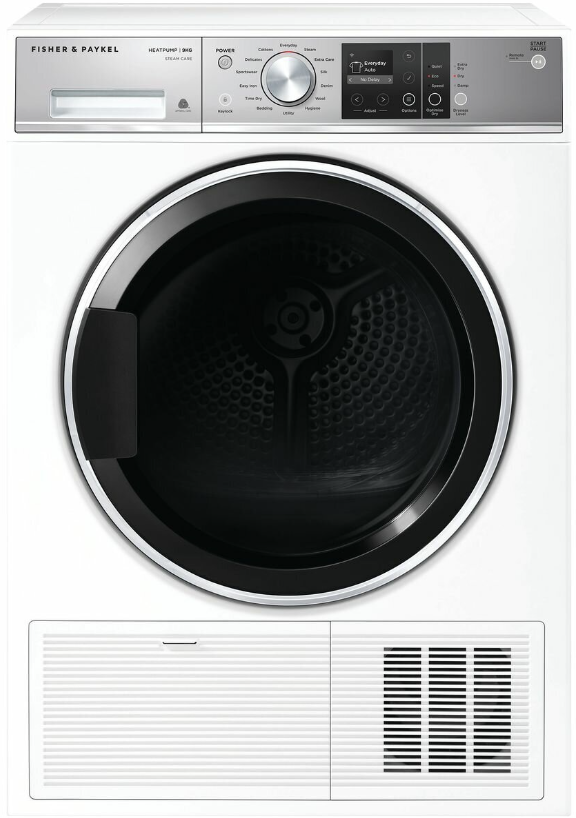
Fisher & Paykel is another brand offering a clothes dryer with a 10-star energy efficiency rating. It offers 23 different fabric care cycles including Steam Freshen, sneakers and easy iron. With TangleProtect, hygiene cycle and quiet mode, this clothes dryer is a convenient model for the family.
Retailing for $1,899 (RRP) and estimated to use 105kWh/year, your energy savings from this appliance could really add up.
- 10 stars for energy efficiency
Most energy efficient air conditioners
Air conditioners are perhaps the most notorious for energy inefficiency. Be aware that constant use of these appliances can blow out your power bill. Some are worse than others, but luckily brands such as Braemar and Haier are working to increase energy efficiency of their air conditioners.
It is important to note that energy efficiency ratings can vary for cooling and heating with most air conditioners, particularly with reverse cycle systems.
Braemar Airvolution Split System Reverse Cycle Air Conditioner (TCHV35T1S/TSHV35T1S)
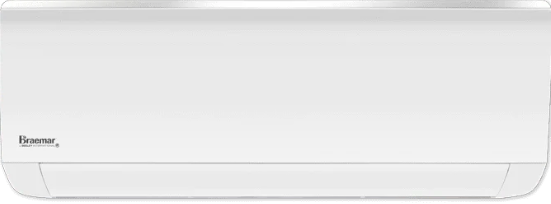
For one of the best air conditioners on the market you can’t go past Braemar Airvolution Split System Reverse Cycle Air Conditioner and its high energy efficiency rating. It’s packed with features such as quiet mode, meaning it has low noise even at full capacity. It is adaptive to multi split air conditioning and R32 Refridgerant that contributes to its higher efficiency, according to Braemar by Seeley International’s website.
The Braemar Airvolution is available in five sizes, making it possible to cool or heat domestic and commercial spaces. The unit has an output of 4.5kW and can be controlled via the EWPE Smart app or the Airvolution controller. You can expect to pay $2,170 (RRP) for this model.
- 4.5 stars for cold zone energy efficiency (SEER Cooling Star Rating)
- 5.5 stars for hot zone energy efficiency (SEER Cooling Star Rating)
- 10.0 stars for cold zone energy efficiency (SEER Heating Star Rating)
- 3.0 stars for hot zone energy efficiency (SEER Heating Star Rating)
Haier Quartz 2.5kW Reverse Cycle Split System Air Conditioner (AS25QCEHRA-SET)
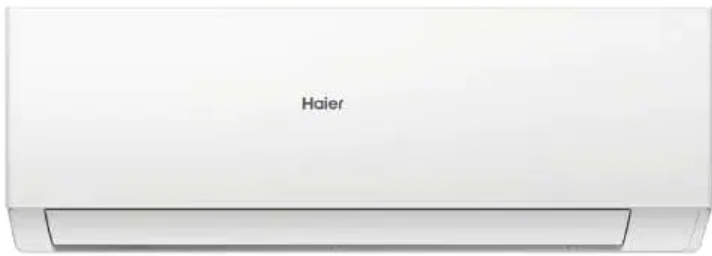
This Haier Quartz 2.5kW air conditioner features a self-cleaning function and UV Protect, that claims to help kill airborne pathogens in Health mode. This unit has been engineered to send airflow further in an effort to maximise even circulation – called the Coanda Plus airflow. With built-in WiFi smart control, the Haier Quartz can be connected to Google Home for ease of use.
The 2.5kW cooling capacity and 3.2kW heating capacity makes it a year-round asset, along with its sleep mode that supports maximum comfort for sleep conditions. This unit retails for around $920.
- 7.5 stars for cold zone energy efficiency (SEER Cooling Star Rating)
- 10.0 stars for hot zone energy efficiency (SEER Cooling Star Rating)
- 2.5 stars for cold zone energy efficiency (SEER Heating Star Rating)
- 3.0 stars for hot zone energy efficiency (SEER Heating Star Rating)
Most energy efficient TVs
TVs can use up a large amount of energy, even on standby mode. As technology develops, better energy efficiency is becoming more accessible. See what these two brands have to offer below.
LG 75″ 4K UHD Hospitality TV with Pro:Centric (75UM767H0LD)
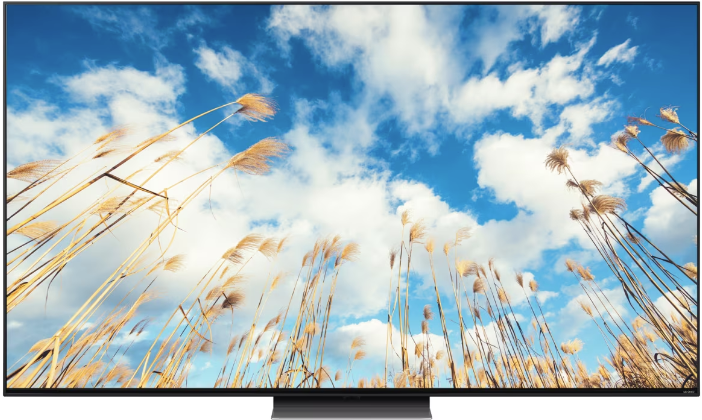
The LG 4K UHD TV has an eight-star energy rating starting from $1,695 (RRP). It features 4K Ultra HD resolution, voice recognition and Pro:Centric Cloud access – supporting the Content Management System with a variety of design templates. It has AI sound, AI acoustic tuning and LG sound sync for a better sound experience. This model also comes with hospitality features for hotels and businesses, such as a welcome image and lock mode.
- 8 stars for energy efficiency
TCL 4K UHD Roku TV (RP630)
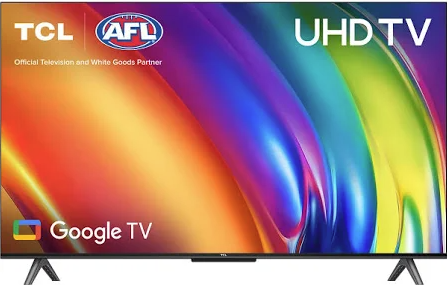
This 65-inch TV from TCL has an energy-efficiency rating of eight stars. It features High Dynamic Range (HDR) technology designed to manage colour, brightness and contrast capabilities. This model also has Clear Motion Rate (CMR) for clearer sports and movies and smart connectivity and works with Google Assistant, Apple HomeKit, Alexa and Apple AirPlay.
TCL’s product also comes with the Entertainment Hub, powered by Roku, making TV viewing varied. You can pick this model up for $899 (RRP).
- 8 stars for energy efficiency
You might also be interested in:
Are these energy efficient appliances right for me?
Although these appliances are energy efficient, they are also often very costly. Before buying new appliances, consider how long it will take to recoup the cost of the unit price versus the actual energy savings over time.
Once you have looked at the star ratings sticker, it’s also important to research the appliances you need in relation to your household size.
Finally, energy efficient appliances are best paired with the right energy plan for your needs. Compare a range of energy providers using Canstar Blue’s free comparison tool below. Just click the link, add your postcode and you’re good to go.
Original reporting by Kelseigh Wrigley
Image Source: Digital Genetics/Shutterstock
FAQs about energy efficient appliances
The best way to determine which appliance will be the most energy efficient is through the star ratings sticker found on the box or appliance itself. Thanks to a Federal Government initiative to help consumers, most appliances – mainly whitegoods – are required to have an energy ratings label displayed. This rating is usually out of six stars (although some do go up to 10) and measures the appliance’s approximate annual energy consumption. Appliances with the lowest annual energy consumption will typically have the highest star rating and thus be the most energy efficient, but it’s best to compare all the specifications to ensure it will be the most energy efficient for you.
To improve the energy efficiency of your appliances it’s best to see if they are already considered energy efficient. You might find that some of the older appliances in your home, though sturdy and dependable machines, are eating up your power bill, so switching to more energy-efficient appliances where you can could be a way to ensure maximum energy efficiency.
If it’s not in the budget to switch your pre-existing appliances over to energy-efficient products, then there are still some things you can be doing to improve the energy efficiency of your appliances. This could include running it on a shorter, more eco-friendly cycle, turning it off at the switch when it’s not in use (if that’s possible) and using cold water as opposed to hot when you can.
Avoiding second-hand appliances where you can will also improve energy efficiency. These products tend to be less energy efficient and could be more likely to break in a shorter amount of time.
Energy efficient appliances that have been purchased by an individual in a store generally won’t be tax deductible. However, there are certain rebates and schemes across Australia that reward certain energy efficient purchases.
Here are the current energy efficient schemes and rebates available for residents as of October 2024:
VIC: Receive discounts and special offers to help cover cost of replacing fridges and freezers, heating and cooling, hot water systems, lighting, TVs, clothes dryers, pool pumps and in home energy displays under the Victorian Energy Upgrades program. Conditions apply.
QLD: Receive financial incentives when installing energy-efficient air conditioning through the PeakSmart air conditioning program. Available on the Energex and Ergon Energy network. Conditions apply. The QLD Government also previously offered financial assistance through the Climate Smart Energy Savers scheme. This program however, has now closed.
NSW: Receive financial incentives for switching to energy efficient LED lights, air conditioning units, hot water systems or pool pumps through the NSW Government’s Energy Savings Scheme. Conditions apply.
ACT: Receive financial incentives for upgrading to energy efficient products through the ACT Government’s Home Energy Support Program. Interest-free loans are also available through the government’s Sustainable Household Scheme. Conditions apply.
SA: Receive free or discounted energy updates from eligible energy retailers that participate in the Retailer Energy Productivity Scheme (REPS). Conditions apply.
TAS: Access an interest-free loan for the purchase of energy efficient products through the Tasmanian Government’s Energy Saver Loan Scheme. Conditions apply.
For a full list of terms and conditions for these rebates, please visit the respective government sites.
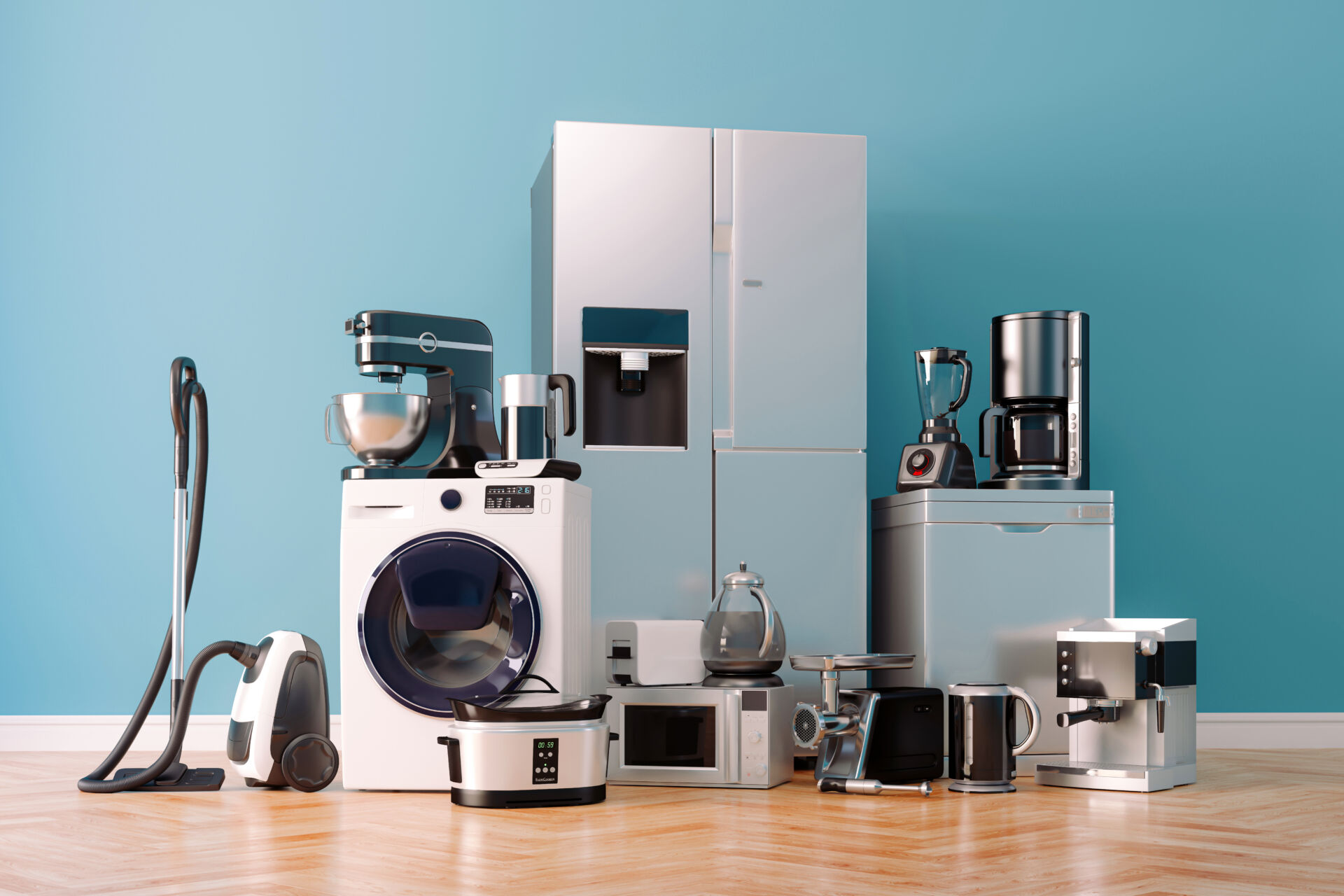



Share this article